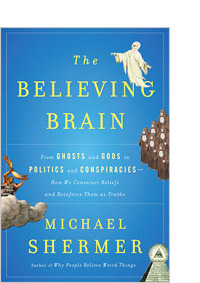The rise of the atheists

In recent years much has been written about the rise of the “nones”—people who check the box for “none” on surveys of religious affiliation. A 2013 Harris Poll of 2,250 American adults, for example, found that 23 percent of all Americans have forsaken religion altogether. A 2015 Pew Research Center poll reported that 34 to 36 percent of millennials (those born after 1980) are nones and corroborated the 23 percent figure, adding that this was a dramatic increase from 2007, when only 16 percent of Americans said they were affiliated with no religion. In raw numbers, this translates to an increase from 36.6 million to 55.8 million nones. Though lagging far behind the 71 percent of Americans who identified as Christian in the Pew poll, they are still a significant voting block, far larger than Jews (4.7 million), Muslims (2.2 million) and Buddhists (1.7 million) combined (8.6 million) and comparable to politically powerful Christian sects such as Evangelical (25.4 percent) and Catholic (20.8 percent).
This shift away from the dominance of any one religion is good for a secular society whose government is structured to discourage catch basins of power from building up and spilling over into people’s private lives. But it is important to note that these nones are not necessarily atheists. Many have moved from mainstream religions into New Age spiritual movements, as evidenced in a 2017 Pew poll that found an increase from 19 percent in 2012 to 27 percent in 2017 of those who reported being “spiritual but not religious.” Among this cohort, only 37 percent described their religious identity as atheist, agnostic or “nothing in particular.”
Even among atheists and agnostics, belief in things usually associated with religious faith can worm its way through fissures in the materialist dam. A 2014 survey conducted by the Austin Institute for the Study of Family and Culture on 15,738 Americans, for example, found that of the 13.2 percent who called themselves atheist or agnostic, 32 percent answered in the affirmative to the question “Do you think there is life, or some sort of conscious existence, after death?” Huh? Even more incongruent, 6 percent of these atheists and agnostics also said that they believed in the bodily resurrection of the dead. You know, like Jesus. (continue reading…)
read or write comments (42)
Where in the world are the atheists? That is, in what part of the globe will one find the most people who do not believe in God? Answer: East Germany at 52.1%. The least? The Philippines at less than 1%. Predictably, strong belief shows a reverse pattern: 84% in the Philippines to 4% in Japan, with East Germany at the second lowest in strong belief at 8%. Not surprising, those who believe in a personal God “who concerns himself with every human being personally” is lowest in East Germany at 8% and highest in the Philippines at 92%.
These numbers, and others, were collected and crunched by Tom W. Smith of the National Opinion Research Center (NORC) at the University of Chicago, in a paper entitled “Beliefs About God Across Time and Countries,” produced for the International Social Survey Programme (ISSP) and released on April 18, 2012. Smith writes: “Countries with high atheism (and low strong belief) tend to be ex-Socialist states and countries in northwest Europe. Countries with low atheism and high strong belief tend to be Catholic societies, especially in the developing world, plus the United States, Israel, and Orthodox Cyprus.”
Many religious scholars invoke the “secularization thesis” to explain lower religiosity in Northern European countries (compared to the United States) in which mass education, especially in the sciences, coupled to the fact that governments do what religions traditionally did in the past in taking care of the poor and needy. With a tight social safety net religions simply fall into disuse; with a porous social safety net people fall through the cracks and are picked up by religions. Other scholars have suggested a “supply side” explanation for the difference between the U.S. and Europe, in which churches and religions in America must compete for limited resources and customers and thus have ratcheted up the quality of religious products and services: mega churches with rock music, baby sitting, BBQs, and even free parking! Smith seems to find evidence of both forces at work, noting that “In the case of Poland, it appears that its strong Catholicism trumps the secularizing influence of Socialism,” whereas elsewhere in the world “there is also evidence that religious competition and/or religious conflict may stimulate higher belief.” (continue reading…)
Comments Off on Atheist Nation
Recently my friend and colleague in science and skepticism Neil deGrasse Tyson, issued a public statement via BigThink.com in which he stated that he dislikes labels because they carry with them all the baggage that the person thinks they already know about that particular label, and thus he prefers no label at all when it comes to the god question and simply calls himself an agnostic.

The Believing Brain
by Michael Shermer
In this book, I present my theory on how beliefs are born, formed, nourished, reinforced, challenged, changed, and extinguished. Sam Harris calls The Believing Brain “a wonderfully lucid, accessible, and wide-ranging account of the boundary between justified and unjustified belief.” Leonard Mlodinow calls it “a tour de force integrating neuroscience and the social sciences.”
(continue reading…)
Comments Off on Are you an Atheist or Agnostic?

Yours truly, leading the Reason Rally Cheer (photo by John Welte)
March 24, 2012 marked the largest gathering of skeptics, atheists, humanists, nonbelievers, and “nones” (those who tick the “no religion” box on surveys) of all stripes on the Mall in Washington, D.C., across from the original Smithsonian museum. Crowd estimates vary from 15,000 to 25,000. However many it was, it was one rockin’ huge crowd that voiced its support for reason, science, and skepticism louder than any I have ever heard. Anywhere. Any time. Any place. It started raining just as the festivities gathered steam late morning, but the weather seemed to have no effect whatsoever on the enthusiasm and energy of the crowd…or the speakers and performers. The organizer and host David Silverman and his posse of tireless staff and volunteers pulled it off without a hitch. Organizing big events can be an organizational nightmare, but they did it, marking what I hope is the first of many consciousness raising events in the civil rights movement for equal treatment for us nonbelievers and skeptics. (continue reading…)
Comments Off on Reason Rally Rocks
Foreigners could be forgiven for thinking that America is fast becoming a theocracy. No fewer than three of the remaining Republican candidates (Rick Perry, Rick Santorum, and Michele Bachmann) have declared that they were called by God to run for the country’s highest office. Congress recently voted to renew the country’s motto of “In God We Trust” on nothing less than the coin of the realm. And this year’s Thanksgiving Forum in Iowa (co-sponsored by the National Organization for Marriage) featured most of the major Presidential candidates competing for the title of God’s quarterback.
Rick Santorum, for example, in the course of denouncing Islamic Sharia law, inadvertently endorsed the same as long as it is a Christian on the Judge’s bench: “Unlike Islam, where the higher law and the civil law are the same, in our case, we have civil laws. But our civil laws have to comport with the higher law.” Not content to speak in such circular generalities, Santorum targeted his faith: “As long as abortion is legal—at least according to the Supreme Court—legal in this country, we will never have rest, because that law does not comport with God’s law.” God’s law? That is precisely the argument made by Islamic imams. But Santorum was only getting started. “Gay marriage is wrong. The idea that the only things that the states are prevented from doing are only things specifically established in the Constitution is wrong. … As a president, I will get involved, because the states do not have the right to undermine the basic, fundamental values that hold this country together.” Christian values only, of course. (continue reading…)
Comments Off on E Pluribus Unum for all faiths and for none




